Art as Politics
Nabra Nelson: Salam Aleykum. Welcome to Kunafa and Shay, a podcast produced for HowlRound Theatre Commons, a free and open platform for theatremakers worldwide. Kunafa and Shay discusses and analyzes contemporary and historical, Middle Eastern and North Africa, or MENA Theatre from across the region.
Marina Johnson: I'm Marina.
Nabra Nelson: And I'm Nabra.
Marina Johnson: And we're your hosts.
Nabra Nelson: Our name Kunafa and Shay invites you into the discussion in the best way we know how, with complex and delicious sweets like Kunafa and perfectly warm tea or, in Arabic, shay.
Marina Johnson: Kunafa and Shay is a place to share experiences, ideas, and sometimes to engage with our differences. In each country, in the Arab world, you'll find Kunafa made differently. In that way, we also lean into the diversity, complexity, and robust flavors of MENA Theatre. We bring our own perspectives, research, and special guests in order to start a dialogue and encourage further learning and discussion.
Nabra Nelson: In our third season, we highlight queer MENA and SWANA, or Southwest Asian North African, theatremakers and dive into the breadth of queerness present in their art.
Marina Johnson: Yalla, grab your tea. The shay is just right.
Nabra Nelson: Is art inherently political? Must artists consider sociopolitics in the development of their work? Working across artistic genres, Hamed Sinno's art had been constantly and publicly politicized. In this episode, we hear about Sinno's own artistic process and how they approach their art in light of this politicization. We will explore how art and artists are involved in politics and hear one person's perspective on the role of art and politics in the MENA and SWANA region and beyond.
Marina Johnson: Hamed Sinno is a writer, musician, and social justice snowflake, born and raised in Beirut, and currently living in New York. They have an MA in digital music from Dartmouth College and a BFA from the Department of Architecture and Design at the American University in Beirut, where they founded and fronted Lebanese indie band Mashrou' Leila. Their songwriting leverages rhetoric, poetry and social justice to weaponize popular culture. Equal parts sequined boy band and political lobby, over the fourteen years since the band's inception, they've been at the forefront of conversations around freedom of expression, gender justice, and the Arab Spring, performing around the world's audiences upwards of three hundred thousand and attracting the ire of religious and political authorities across the Middle East. With the Fatwa and multiple bands under their belt, H moved to the US and is currently exploring narratives of estrangement while centering their research on vocality and voice synthesis as sites of political negotiation.
Nabra Nelson: Hamed, it's so wonderful to have you on. Thank you so much for being a part of this podcast.
Hamed Sinno: Thank you for having me.
Nabra Nelson: We're recording this in May of 2023, and I know that you're in London right now working on some exciting stuff. Can you just update us on where you're at right now? I know a lot of folks know about your music career. We're going to be talking a lot about your theatre work. But what are you working on right now and coming up for you?
Hamed Sinno: Great. So, I'm in London. I have a show debuting on the eighth of July here called Poems of Consumption. It's sort of a song cycle/online art intervention. It's a little all over the place, but I'm very excited about it and also very, very nervous.
Nabra Nelson: Did you write this piece, directing it, performing? What is your role? Everything?
Hamed Sinno: I'm a little spread thin right now. So basically it's like, okay, you know what? I'm just going to tell you exactly what the project is.
Nabra Nelson: Please, yeah.
Hamed Sinno: Because then it'll make much more sense. So essentially, I've been doing a lot of research on that sort of Venn diagram of mental health, the environment, and Amazon era consumerism. And what I do is I will buy something on Amazon, like let's say a pill organizer, and I'll write poetry that is sort of tangentially related to the pill organizer, but essentially about that Venn diagram of things that I'm researching. And then I'll use the Amazon review section as sort of my wall for graffiti. So I'll post the poetry inside that review section, which is kind of hilarious when you look at it, because really the reviews are quite earnest often. And then you have me writing in cryptic, very melodramatic language.
And so I'm working on the poetry. I'm writing the poetry for that. I just got a co-writer on board that I'm very excited about. He's a wonderful poet, New York based poet called Jimin Seo. And I'm setting the poems to song, and I'm performing that on the eighth of July at the Barbican. And the music itself is also made out of the product, so I sort of record the packaging. It kind of has an ASMR textural vibe in the background behind all the beats and everything. And yeah, that's what we're doing live on the eighth, and it's so much to do that. Yeah, I might die, but I'm very excited about it.
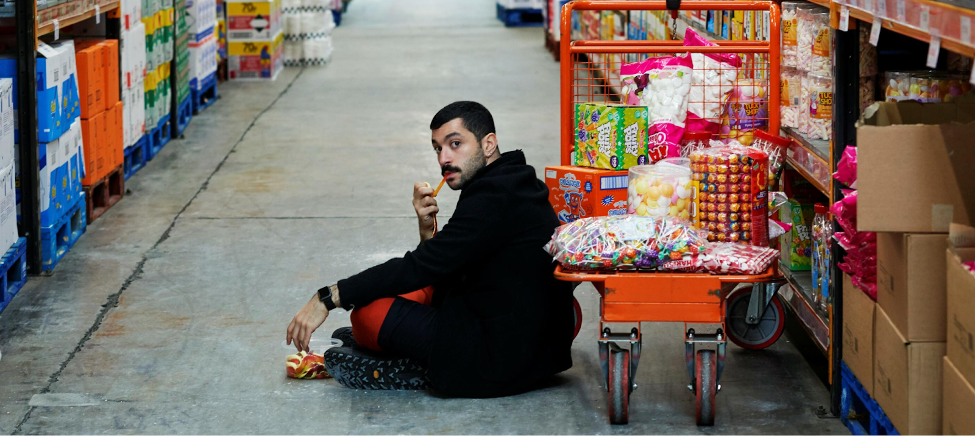
Hamed Sinno in Poems of Consumption by Hamed Sinno at the Shubbak Festival at the Barbican Hall in London. Photo by Derrick Kakembo.
Nabra Nelson: Oh my goodness. I wish you could see my face, because I am so into this project idea.
Hamed Sinno: Thank you.
Nabra Nelson: I just love this absurdist, consumerist, multidisciplinary multimedia mashup. So exciting. Wish I could be in London for it.
Hamed Sinno: Thanks. You should come. Honestly, multidisciplinary, it seems to be my little shtick right now. So I'm also using the packaging to make artwork that I'm then selling to raise money for environmental NGOs. It's like a whole thing. It's unnecessarily large.
Nabra Nelson: That is so exciting. That is so exciting. Wow.
Marina Johnson: Well, this is so great, because so I mean, forever I have known you as a person, as many people do, in Mashrou' Leila, and following your songwriting and what's happening in the music realm. And then I am working on Golden Thread Productions ReOrient this summer, so then I began to know you as a playwright, which is really exciting, with your play, The Suicide Bomber. Is that the title?
Hamed Sinno: Yes, that is the title. Unfortunate, but yes.
Marina Johnson: So I would love to talk more about when did you start writing plays? And because you use all of these different modes of storytelling, what do you see as theatre’s draw as a means of storytelling versus other media?
I like to queer these things, just really going back and forth between purported disciplines as I please.
Hamed Sinno: Right. I mean, look, so the tricky part with trying to answer that question is one, I can't pretend to be a seasoned theatremaker, so I would not honestly take myself seriously comparing it to other disciplines. But I think the other thing is that the moment you start doing that, you kind of draw something of a boundary, right? Sort of a borderland around what you're defining theatre as, which is already self-defeating. And I think what I like to do is just leave things very, sorry, this is going to sound very pretentious, but I think I like to queer these things, just really going back and forth between purported disciplines as I please. And at this point really just like that seems to be my thing. I'm only going to do things the way I want to for literally no other reason than that I want to. And I think that's sort of how I've been trying to approach theatre.
Because, yeah, for the longest time ever, so I kind of had this really intense writer's block, maybe about five years ago, sort of life with a band had gotten really, really, really intense. I felt like I was tapped out. Right? I had been producing lyric, texts, and music nonstop for twelve years, sorry, ten years at the time. And I felt like I had very little left inside me to tap into. And to be honest, something about opening, like I'll open a Word document to start writing, and immediately, as soon as I'm looking at the white background, there's sort of the promise of some sort of punishment before I've even written anything because of the amount of pushback the band was getting across the Middle East and the amount of hate that I was getting in my inbox all the time. It just, something happened. And that relationship I had to writing and to language was kind of corrupted for a bit, for lack of a less melodramatic term.
And so when I went back to grad school, it was kind of an accident. I took a playwriting class because I kind of wanted to force myself to start using language in other ways, hoping that that would sort of reignite my relationship to songwriting. And instead, I just fell in love with that discipline of writing a script, whatever that means. I got really lucky. I had this amazing professor at Dartmouth called Mfoniso Udofia, who is a brilliant, brilliant playwright and script writer in general. And yeah, she was great to work with, and it kind of just happened. I don't know if it's necessarily something that I will continue to do moving forward as much as... Yeah, I feel like what I've learned from script writing is stuff that's coming into my practice right now, if that makes sense.
Marina Johnson: Definitely. Well, and I love that you're drawing the attention to the fact that disciplines like gender and other binaries that's fake. And so being able to really move between them is an exciting thing. And appropriately calling it the queering of these boundaries or of these disciplines is really exciting. And it's the work that I'm drawn to in performance where it's really not just one thing, because none of us are one thing. We want capacious ways to describe our experiences as humans. So I love the way you described that.
Hamed Sinno: Thank you.
Nabra Nelson: Can you talk more about...
Marina Johnson: Can you tell us?
Hamed Sinno: I can do both.
Nabra Nelson: Do everything. Talk about everything.
Hamed Sinno: I can do it all. Sorry. It's like tell me you were assigned male at birth without telling me you were assigned male at birth. I can do it, everything. Yeah. Sorry, go on.
Nabra Nelson: I'll jump in, because this is around, I wanted to ask more about this idea of queering, because it's used a lot, but I think because it's appropriately a very wide term that can apply to so many different ideas of art making and ways of seeing the world. And we, throughout this podcast season, are really rethinking and expanding what queer means. And so I'd love to hear what you define as queering your work or queering art for your own practice and a way of seeing the world.
Hamed Sinno: So I mean, that's a tricky thing with defining queer, right, is that it's, again, a self-defeating venture, right? But I think for me, it's really just a question of having this hypersensitive reaction to binaries, perhaps because of the way I was raised, perhaps because of the limited gender exploration that I got to do with my own body when I was in Beirut. There's just something about yes and no, and black and white, and male and female, and musical and opera, and theatre and performance. These things just feel so restrictive. And I think for the most part, if you look at a lot of the more interesting, sort of cutting edge work that happened in, let's say, sixties and seventies in most disciplines, it's always been about pushing the boundaries of that borderland, the lines we draw around discourse. And at some point it's like, well, why are we still pushing the lines instead of just not having them, really?
And I think that's how I like to approach things is that I don't want to say I'm writing theatre as much as I'm writing this thing that's going to be on stage. This thing that I'm doing at the Barbican on the eighth of July is being advertised as a song cycle, but really it's a multidisciplinary project with art and performance, and there's scripted parts, and I'm really intensely melodramatic. And some of it would not ever pass the Spotify check, like no one wants to listen to a ten-minute melodramatic track about being at the bottom of the sea, crawling as an abalone shell. It's not song, necessarily. Yeah, I don't know. I don't want these things. I don't want gender. I don't want ethnicity. I don't want any of it. I just want to do stuff on stage and be a body on stage, and perhaps rather narcissistically continue to write myself onto stage. But that's another conversation.
I feel like everything is inherently political.… When you put things on stage, you summon a world from thin air and the bodies you put on stage, how they interact with each other.… You're bringing something into reality that wasn't there before. So there is something inherently political about the discipline, about creating worlds where a bunch of queer and trans people of color can live their best lives, right?
Marina Johnson: Well, I think this ties into one of our other questions we had for you, which is that your work has been politicized. And you talked about this moments ago, this image of opening a Word document and having the work be corrupted before it was even written because of the way that your work has been politicized because of your identity. And something that we were wondering is, I think we've seen from the outside how it seems like this affects your trajectory of your career and your art, and it seems like you're pushing boundaries because of these, but we'd love to hear more about the way that you handle this politicization. Whether that's people that you work with that handle press or other things, like how you're navigating these sort of forces that act externally on our work.
Hamed Sinno: Right. Okay. Here's the thing. I think deep down, I feel like everything is inherently political. The fact of making music or theatre is inherently political. When you put things on stage, you summon a world from thin air and the bodies you put on stage, how they interact with each other, you’re making something happen. You’re bringing something into reality that wasn’t there before. So there is something inherently political about the discipline, about creating worlds where a bunch of queer and trans people of color can live their best lives, right?
But I think the flip side of that is that sometimes for some artists, if you’re lucky, that means you can do whatever you want and pursue joy. And I think for a lot of artists of color, specifically artists who are from quote unquote “the global south,” that tends to mean that our work only matters when it can be read as political in a way that Europe and America deems appropriately or adequately political, right. So there’s this sort of expectation to rise to politics that can be really toxic. And for quite some time, I think I felt like I was quite lucky to be in the position that I was in to get to share my politics, to be given that kind of platform. It really was a blessing. But I guess I didn’t notice that it was also very restricting.
And I think maybe that was part of why it became really difficult for me to write at some point, is it really just felt like there was a mountain of expectations. And obviously, the world doesn’t owe me audience. It doesn’t owe me listenership. I’m very well aware of that, so I’m not suggesting that people should just write whatever, but I think there’s a sweet spot in how much of the outside world you want to bring into your writing process.
And I think I lost track of that. So by the time I wrote The Suicide Bomber, which is the play that will be in production with Golden Thread, that was the only play I could have possibly written at that time because it was literally about that political expectation and how toxic it can be. Right now, I think as I’m moving forward with new work, I’m trying to be very aware of that pressure and where it’s taken me in the past and to avoid it.
So with Poems of Consumption, for example, there’s a really big component of it where I’m just writing about love, and I don’t want to write about consumerism in that sort of didactic political sense. We all know where we stand on consumerism and what it’s doing to the world. We don’t need one more person going, “buying bad.” I’m just really trying to find space in which I can approach myself, my personhood, my humanity in my writing, and to acknowledge that, for myself, at least for me, that feels political right now to allow myself to just write as a person instead of writing as a voice that has to be political because it’s Brown. Does that make sense?
Nabra Nelson: Oh, absolutely. Yeah. And that deeply resonates. We talk a lot about how this just MENA identity in general and queer identity, as well, are inherently politicized, and it can feel very restrictive as an artist. But the way that you framed it makes perfect sense, as well, that all art is political and it needs to be conscious of that. We just have more external forces acting upon us when it comes to how our art is divined or is seen or what we need to consider perhaps. Or perhaps, justifiably ignore or very consciously ignore if we're doing the work that we want to be doing.
And so one question I wanted to ask is: if you were fully in control of the narrative around your art and how you're talked about as an artist, how would you like your work to be framed by your audience, by critics, by those around you?
Hamed Sinno: Wow. Okay. So a tricky question at the moment, right? Because again, for the longest time ever, I was working with a group of people and how I would've wanted people to talk about that work is one thing. Right now, I mean, it really is this sort of wondrous and deeply painful, but also just deeply rewarding and reparative time for me where I'm trying to figure out what my work alone looks like. Right? And to be honest, I am not sure I know how I want other people to speak about it. I don't think it really matters what I want with that, right? Again, the world doesn't owe me audience or listenership. If people like it for whatever reason, I will count that as a blessing and roll with that. I think it's more of a question of me wanting to look at my own work in a specific way.
And right now, I know this sounds terribly cliched and perhaps even toxic coming from a body that is Lebanese and assigned male at birth, but there's a question of integrity that matters deeply to me, especially after, again, the last five years of just losing everything with the Lebanese banking crisis and going into full lockdown with Covid, and really just my entire career and life stopped for a while, and I am starting over from scratch with nothing. And the only thing that I get to hold onto is a sense of integrity about my work. I want to keep that. I want it to be so that I'm always approaching music and the stage for music and the stage, and not for other people or for other people liking me or for other people paying my rent, even if that sounds very sort of haughty and self-righteous. It's what I want.
Nabra Nelson: No, that's a wonderful place to be in. I think that's where artists hope to be or hope to at least be able to approach their art for the art sake, for the integrity of the art instead of with all of these external factors constantly influencing it, which is so difficult to navigate. So I think that makes perfect sense.
Hamed Sinno: Yeah, I mean, thank you, I guess. But look, maybe if you asked me this five years ago, I'd have said that someone who says something like what they care most about with their work is the integrity instead of the logistics, then I'd have assumed that that person was a trust fund baby. Which is, I mean, let's be honest, most of the people we're working with right in the arts are people who get to... It takes a certain amount of privilege, or at least I thought it took a certain amount of privilege to prioritize things like integrity.
But honestly, just the last five years of... At some point, I was genuinely worried I was going to be homeless. I do not come from wealth. That's not the kind of access I had. That's not the kind of career I had with the band. And with everything that happened with Beirut, really, at some point I was just in New York scraping the bottom of the barrel, and it honestly just was not that horrible. Yeah. So I guess what I'm saying is I'm saying these things right now, not because I don't actually have to worry about poverty, but more because I'm not as frightened of poverty anymore because it's really not that terrible. I'm on Medicaid like most people, and it's fine.
Nabra Nelson: Interesting. Thank you for that clarification, because it's true that different folks are able to, I guess, get to that place with their mindset around art in different ways. So do you find that what has shifted for, I guess, what has been the main thing that has shifted for you? Was it this kind of full clearing of everything due to the factors of the past five, six years? Or was it this very intentional mindset change? Or some type of combination of both or a different factor that has led you to this kind of new, I guess, way of approaching your art?
Hamed Sinno: I think it's a lot of things. I think it's being where I'm at professionally at thirty-five, and being alone, and working alone for the first time in my entire career, and my career didn't start yesterday. I just hadn't had to navigate these questions alone for a very long time. And honestly, when you're working in a band setting, these questions are almost pointless because it doesn't really matter what you want for yourself. What matters is the group, what the group wants, how your existential decisions affect the group, not just yourself. And this feels like the first time in my life that I'm actually just responsible for myself, and it just feels easier to make those decisions.
Marina Johnson: Definitely. Well, and so you're living in the US right now. You have an international audience, and you're currently in the UK making work. How have these different instances of your location affected how you create your work, if they have? Is it maybe it's thinking about audience differently? Or maybe it's not?
Hamed Sinno: I will tell you the most obvious part is that, so Poems of Consumption, for example, is thus far fully written in English, which is kind of a big deal for me, because I spent a lot of time teaching myself how to write in Arabic. It didn't come naturally to me. And then the flip side of that is after ten years of writing exclusively in Arabic, there was an immediacy about writing in English that made me cringe at all of my writing, to be completely honest, like it was just too direct. And so it's taken me some work to, I guess, rediscover my poetic in another language.
I'm not going to say that that's not related to where I am. I know that if I work primarily in Arabic right now, my exposure is going to be very limited. And I think I kind of just also want a break, to be completely honest. I want a break from needing to prioritize being in the Middle East for work. It was a really brutal time for a very, very long time. And there was just something about being in New York when I first moved and realizing that there were some questions that I had never asked myself because I was in Beirut, and because I was constantly fighting the homophobia and the misogyny. And just being able to distance myself from those questions for a bit has been really rewarding for me. And a lot of that does have to do with not being there, even if that's completely imagined and in my head. Right? I'm not saying there's less homophobia in New York then there is in Beirut, at all. I'm just saying with the way I grew up, it is easier to distance myself from certain questions when I'm in the States than it is to do so when I'm in Beirut.
Marina Johnson: All of these, like so this interdisciplinary approach, I wonder for other artists who are listening, especially queer artists, are there recommendations that you have for them about either how to approach work, or how to approach not caring about audience reception, or how to queer these different aspects of their lives? Is there advice that you would give to people not just within the realm of theatre, but hopefully people who are really interested in making work that speaks and fulfills themselves?
Hamed Sinno: Well, I mean, I guess in terms of fulfillment, I don't know. See, this is where I push back against myself, because I'm inclined to say, unless you wake up wanting to do something, unless your body tells you, you need to be writing that you shouldn't write, but that is also such a privileged thing to say. And I don't know if it's because of the way my brain works, but I'm someone who, again, I didn't write for five years, and right now because I have this deadline, I actually want to write every day. I wake up wanting to write. And I don't know how much of that is because this deadline and impending doom are fast approaching, and how much of it is really just because the writing is bursting out of my cells. Right?
But yeah, I guess I would say don't do what your heart isn't in, because I think that ends up hurting you more than it benefits you more often than otherwise. I think a lot of us are drawn, especially queer people, I think a lot of us are drawn to the arts and to creative expression because of this really almost sacred connection that we have to expressing things in a world that wants us to not express things. Right? And those things are not always expressing ourselves. It's really even expressing our politics, expressing the fact that we exist.
And I think the more time we spend sort of using that connection to the creative self, the more time we spend using that connection in service of things that don't feel rewarding for whatever that thing is that connects the inside of your chest to the back of your throat, that soul personhood, your heart, that thing that breaks. The more time you spend using your work in the service of something that is not that thing that breaks the harder it is, I think, for that connection to be rewarding. Sorry, that sounds really like new age-y and also strangely convoluted for something really stupid. I guess what I'm saying is don't do work that you don't actually want to do, because it'll ruin your relationship to the discipline. Yeah. See, that's much more efficient.
Nabra Nelson: No. We don't want the efficient, you're a poet.
Marina Johnson: You're so poetic.
Hamed Sinno: Sorry.
Marina Johnson: No, it's beautiful. Well I love this pushback between you and another version of you, because we all have these, I mean, I hope at least that people are having these conversations with themselves, right?
Hamed Sinno: Sorry, it's like a Greek choir in here. Honestly, there's five of us fighting at all times. But I guess, you know this better than anyone Marina having read the play.
Marina Johnson: Yeah. No, I mean, I love the play, and I can't wait for everyone to experience this work at Golden Thread. But also, yeah, just this bringing to light this idea of we've all internalized different things, right? And where are these things that we've internalized coming from? Whether it's like, don't do this work unless it's the only work you can do, which I've heard a lot in different training programs that I was in. But you also addressing, well, okay, well, there are layers that we can unpack here, but also you want to be holistic, maybe was part of what the image you were giving was. So yeah, just lots of appreciation for the ways that you beautifully describe these things, and also articulating a conflict that maybe many people feel, but don't always get to say out loud.
Hamed Sinno: All right, thank you. For what it's worth, though, I do think there's something to be said about investing a lot of energy in trying to create your own opportunities instead of just responding to opportunities that are around you. I understand why a lot of my poet friends go into sort of copywriting for advertising agencies and eventually lose their relationship to poetry and just become full-time copywriters for the rest of their lives. I get it. I get that we need to pay rent. But I also see that the people around me who have been most successful at working in their chosen discipline, despite not coming from a trust fund, are people who didn't just try to get a poem published. They tried to forge that platform for themselves if they couldn't find it. Right? If I want to be a songwriter, I can't at the moment, I guess, get Beyoncé to buy one of my songs. So instead, I am figuring out a way to create this multidisciplinary nightmare for myself. But again, I get to do that at this point with some relative ease because of my past career. But anyway, yeah.
Nabra Nelson: Well, it's also, it indicates urgency for the art, which is, I think, what the art I want to see and be a part of has, is this need for it to happen.
Hamed Sinno: Right.
Nabra Nelson: And this carving out of those spaces indicates the need for that to happen. It's not just that the opportunity came, so I wrote a little thing. Yeah. It brings this relevance and importance to your art.
Hamed Sinno: I hope so.
Nabra Nelson: Well, I wanted to end, if you wouldn't mind, I would love for you to, if you don't mind, paint a picture of what the scene is right now for you. Because I know it's somewhat hilarious and I think a little bit of a piece of art in itself, the way that you've joined us right now from your Airbnb.
Hamed Sinno: I mean, I honestly wish, I wish whoever's listening could see, I should probably, once we're done recording, turn my camera on and risk it so that you see exactly the kind of chaos I'm in. But I'm basically in, by accident, probably in the only Airbnb in the world that doesn't have wifi, and have been trying to hotspot myself into this call from my phone for the last hour. And we've had various connection problems, but I'm currently on the floor between the bathroom and the fridge with my phone sort of propped up on a little mountain of shoes to try and get three bars instead of one. And there are various musical instruments and shoes on the floor, as well as a lot of medication. And that is actually a very good summary of my life I feel like. Yeah. I now feel the urge to take a picture of this, to just use it as a Tinder bio and it says it all.
Nabra Nelson: That is amazing. I'm just dying laughing over here. And I also keep hearing kids in the background. Is that happening?
Hamed Sinno: Oh my God, I'm so sorry. Yeah, no, that's the neighbor's.
Nabra Nelson: No, no, it's fine. Oh, it's the neighbor.
Hamed Sinno: Yeah. No, I haven't been blessed with children just yet.
Nabra Nelson: That's hilarious. I've been picturing this whole thing the whole time, and it's amazing and hilarious and just deeply appreciate you making-
Hamed Sinno: Wait, oh, my God. Did you think those were my kids?
Nabra Nelson: I didn't know what was going on. I thought maybe you have people visiting.
Hamed Sinno: Oh my God.
Nabra Nelson: I don’t know how it was in this situation.
Hamed Sinno: No, I really want kids. I just won't have them until I can afford them.
Nabra Nelson: Yeah. Well, for now, you have the Airbnb neighbor's kids to keep you company with your shoe mountain and musical instruments. I mean, we just so appreciative of you making a shoe mountain for us. What a gift. Thank you so much.
Hamed Sinno: Thank you so much for having me, really, and thank you for asking questions are about that are not about queer rights in the Middle East. It's a shockingly rare experience for me, to be honest.
Nabra Nelson: Of course, yes. Folks can look up, I'm sure, many of your interviews around that topic elsewhere, but we're just really thankful to hear about your work right now, and so excited to see your work. We'll both be at Reorient, so thrilled to see your playwriting, as well, and all of what you're doing moving forward.
Hamed Sinno: Brilliant. Thank you so much.
Marina Johnson: Thank you.
Hamed Sinno: Been lots of fun.
Marina Johnson: This podcast is produced as a contribution to HowlRound Theatre Commons. You can find more episodes of Kunafa and Shay and other HowlRound podcasts by searching HowlRound wherever you find podcasts. If you loved this podcast, please post a rating and write a review on your platform of choice. This helps other people find us. You can also find a transcript for this episode, along with a lot of other progressive and disruptive content, on the howlround.com website. Have an idea for an exciting podcast, essay, or TV event the theatre community needs to hear? Visit howlround.com and contribute your ideas to the comments.
Nabra Nelson: Yalla, bye.
Marina Johnson: Yalla, bye.

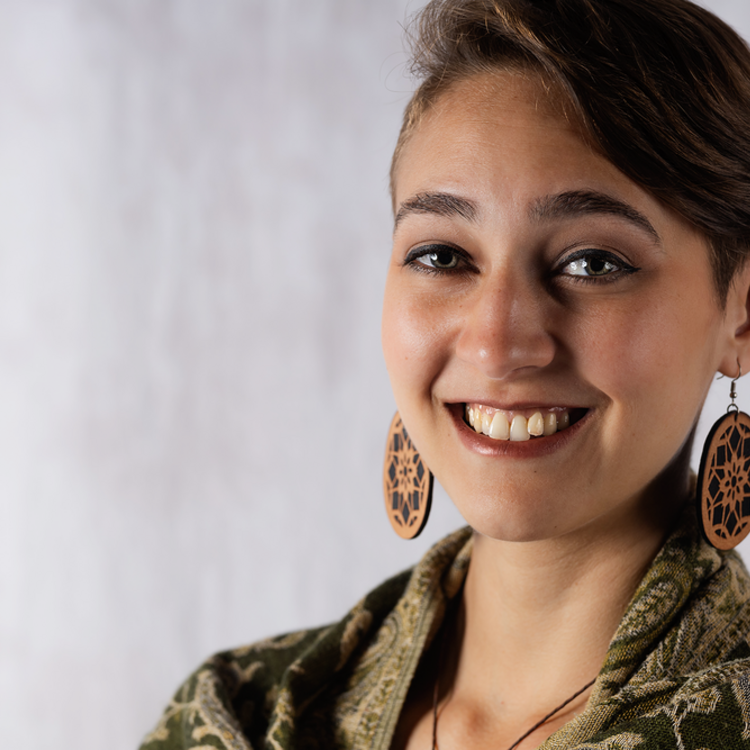
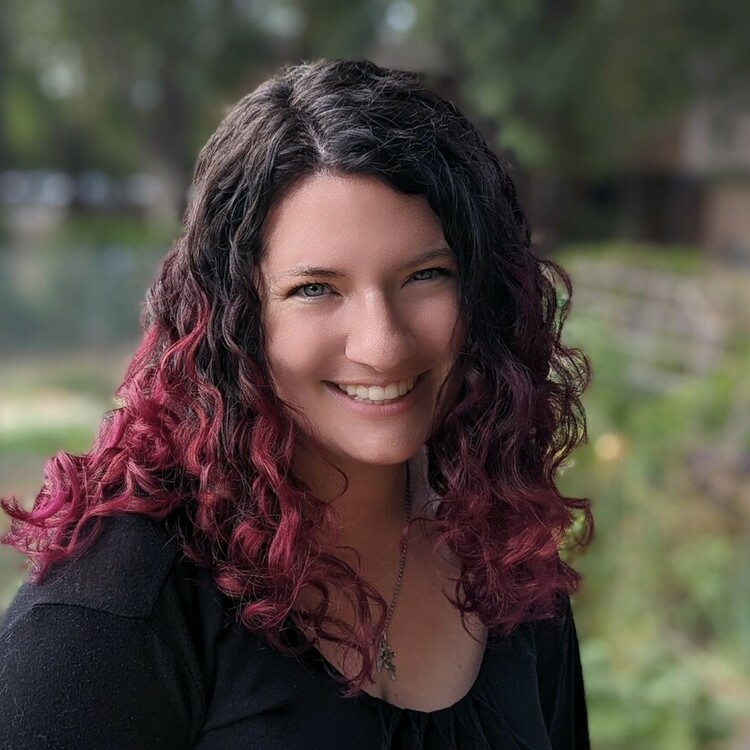
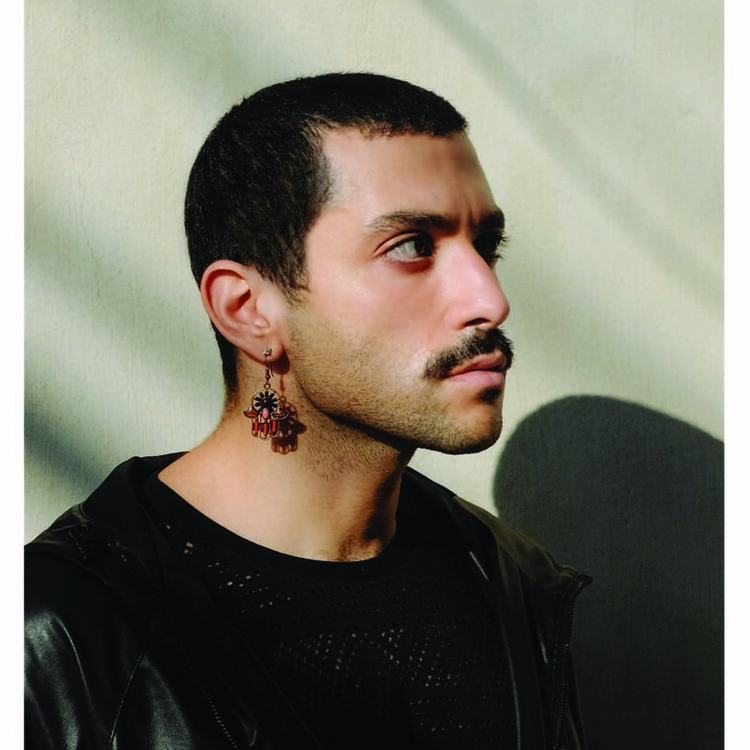
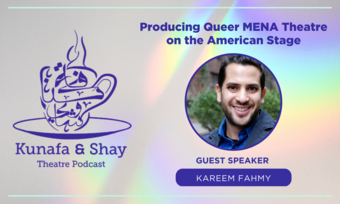



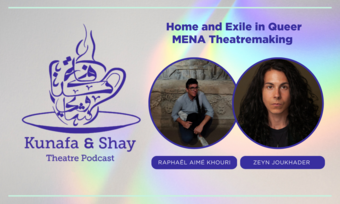


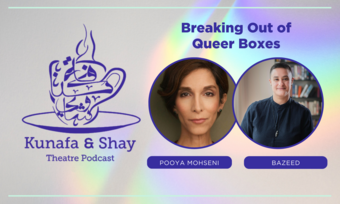


Comments
The article is just the start of the conversation—we want to know what you think about this subject, too! HowlRound is a space for knowledge-sharing, and we welcome spirited, thoughtful, and on-topic dialogue. Find our full comments policy here